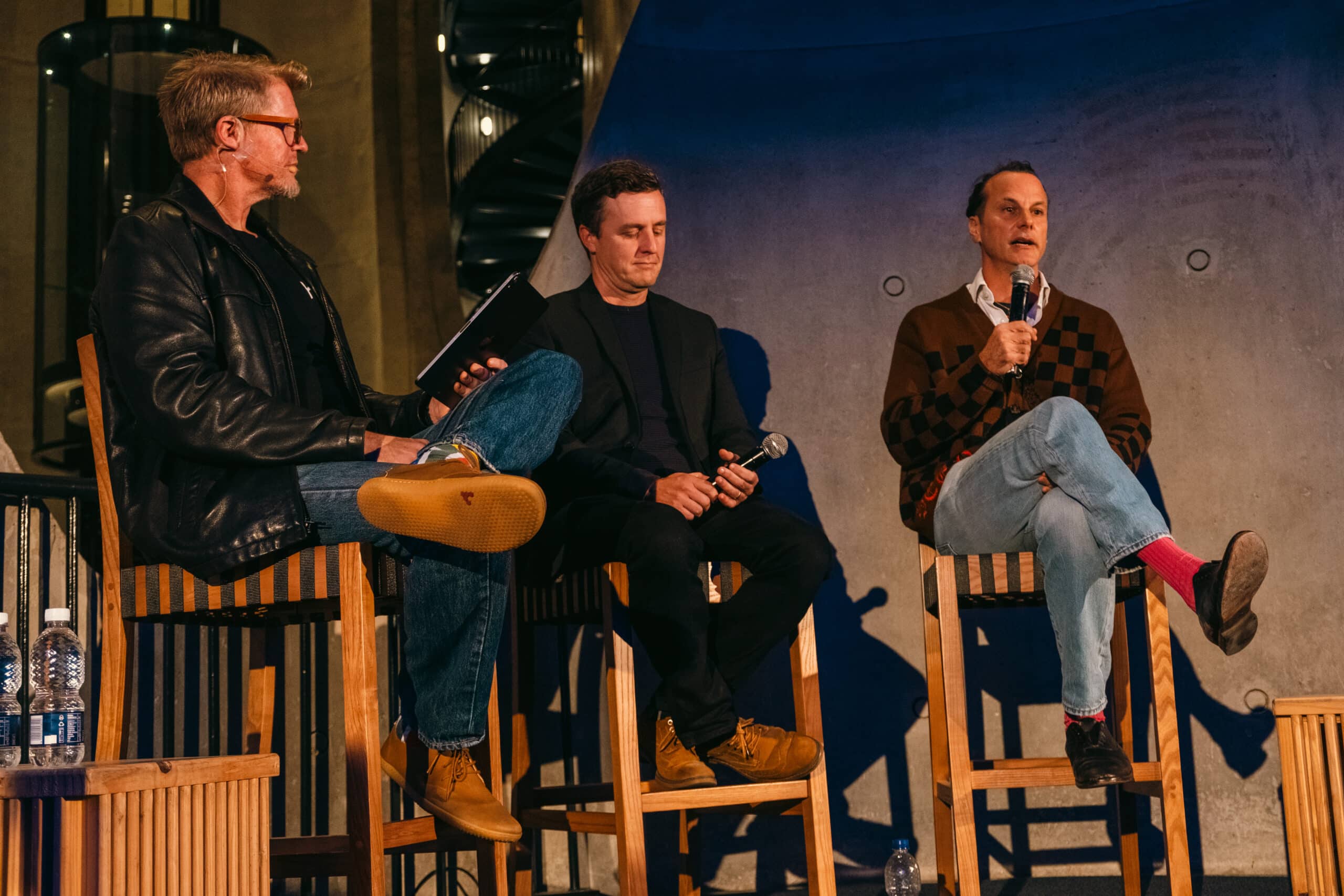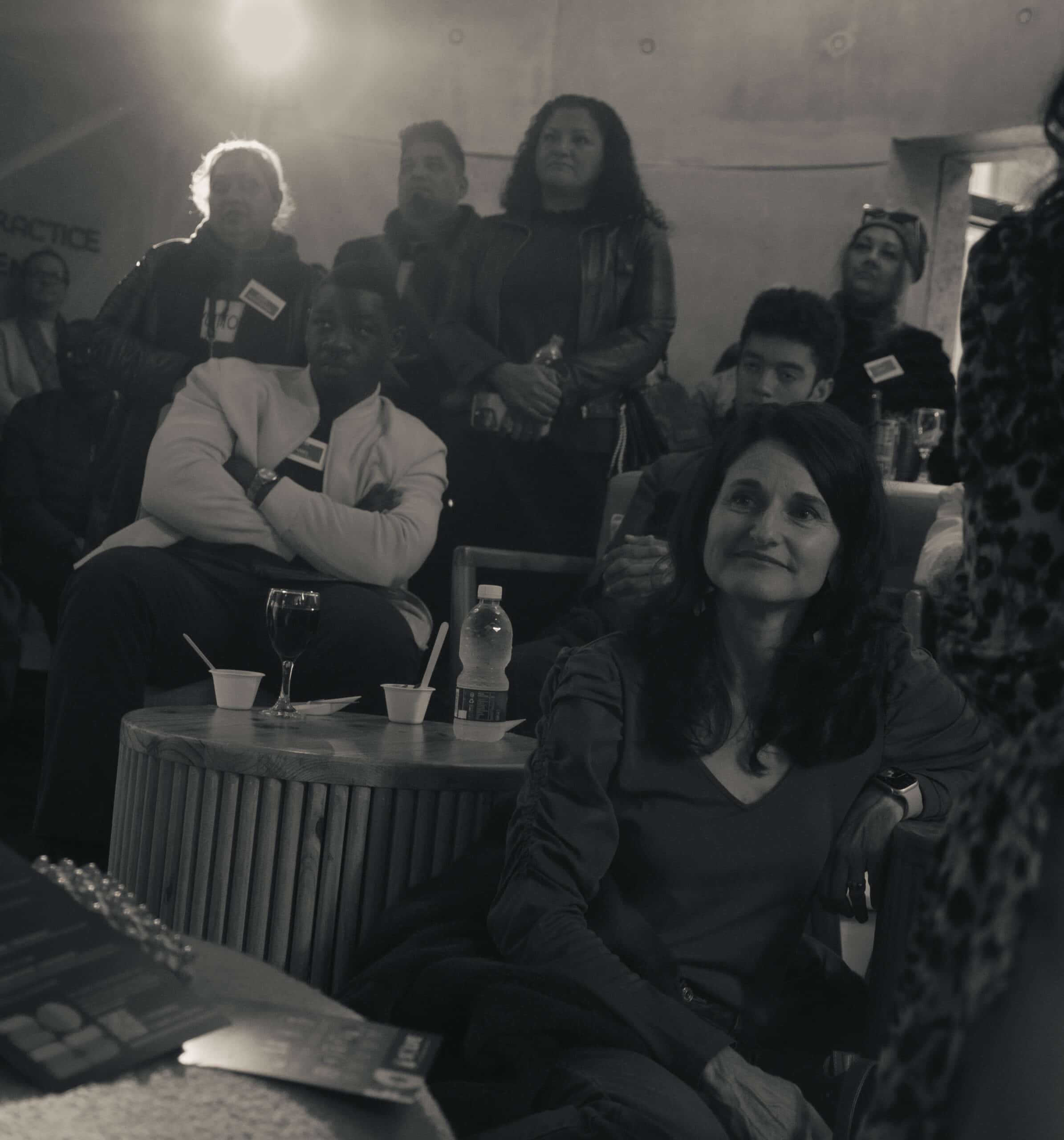From startup to standout

Picture shows: MC and panel moderator Fred Roed of Heavy Chef speaks with Andrew Smith, one of the co-founders of Yuppiechef and, more recently Brave Hardy; and Arie Fabian of We are EGG
Yuppiechef launched as an online-only store in August 2006, the culmination of months of planning and design.
It was a time when “online” was a place people went only if they had no other way to find a particular product, but Yuppiechef’s co-founders had seem the future, and they saw digital coming.
However. Days and weeks went by with no action; then one month, then another, and not a single purchase came down the line. Finally, in November, three months later, the first sale was made.
SMME stomachs across the interwebs will give a lurch of recognition at this. The anticipation, the disappointment, the bootstrapping and dwindling confidence and shrinking bank balance are familiar to most entrepreneurs.
Andrew Smith, co-founder of Yuppiechef and, latterly, Brave Hardy, can speak lightly about it now: Yuppiechef went on to become perhaps South Africa’s greatest online brand success story. From the partners’ working-out-of-our-lounges set-up, the business grew, established bricks-and-mortar stores in prestige centres, and firmly established kitchenware as objects of desire in the national psyche. By the time the partners sold the brand in 2021 to the Mr Price Group, the price tag had reached around R500 million.
What can the rest of us learn from Yuppiechef? Peer learning is exactly why we established the V&A Small Business Dialogues, and Smith was sharing the podium with two other inspiring entrepreneurs: Arie Fabian, co-founder of We Are EGG, and facilitator Fred Roed, CEO & co-founder of Heavy Chef. The overall theme of this evening, hosted at Zeitz Mocaa in July this year, was Winning the evolving customer.
So, let’s start with Smith & Fabian’s insight into winning customers in what Fabian describes as a VUCA (volatile, unstable, complex and ambiguous) world.
WINNING THE CUSTOMER
The Yuppiechef founders had a feeling, Smith says, that apart from range, their offering had to distinguish itself through excellent service. Hence the packaging of your Yuppiechef delivery; the handwritten note; the fridge magnet. “Both have a cost, but it shows that there are real people on the other side, and that you’re not just doing the bare minimum,” he said.
Price influences decisions less than do those kind of touches, agrees Fabian. Customer loyalty is about emotional connection; price sensitivity is towards the bottom of the considerations list if the rest is right. “You need to speak to the heart; you need great product, great service. Price sensitivity just provides some pressure,” Fabian said. Smith echoed this. “It’s hard to hear you’re expensive. The immediate reaction is to try to be cheaper. Everyone wants to increase revenue and profitability, but there are many levers to pull to achieve this. One of them is price, which increases turnover (if not profitability). It’s the easiest one to pull – the others, such as service, are harder. But that’s where you win.”
Between any business’ intentions and its customers, however, are salespeople. “They are your conduit to the customer,” said Smith, “and need to be cherished.” That’s easier said than done, and for many businesses, sales teams have proven to be a source of some pain. Smith tells of his war wounds. “We started in my lounge. At a point we had to hire our first employee, who was going to work in our lounge, use our bathroom, eat at our table, be at home with my wife and children. We had to choose carefully, and we put a lot into it. And yet… they would leave after a day, steal from us… One person held two jobs while they worked for us.
“Despite our high standards, and the fact that it was a high bar we set, we got it wrong.”
We need to get back to the DNA of really caring, Fabian believes. “One of my dad’s employees [at the original Fabiani store at the V&A Waterfront] would never sit down, because if he did he stood a chance of losing a customer. He’d even only go to the loo at a run.” Customer-centricity, he believes, is what makes or breaks any business, and that’s down to the values, attitude and caring of customer-facing staff. For SMME retailers who’re struggling with this same issue it’s useful to hear from Smith that it’s a perennial problem: “Nobody has completely cracked that nut.”
OTHER TOUGH NUTS
Even when you have a supportive landlord like the V&A, Fabian said, there are challenges around supply chain, import bureaucracy, currency fluctuations, and duty structures. For clothing sector SMMEs, there is also the decimation of clothing production in the Western Cape, including the creativity and design at the core. And the internet has been a game-changer: “for a physical retailer, it opened up the whole world of international supply chain and price parity – we had previously only worked in terms of margin.”
There are, in other words, a host of time-intensive demands underlying the operations of businesses, no matter their size. And then there are black swan events, like Covid. Fabian tells of the initial incarnation of We Are EGG, taking over the huge space (7 300 sq m) in Cavendish Square previously occupied by the embattled Edgars. In their first month, they welcomed 95 000+ people through the doors. The next month, Covid reduced that to 30 000, “then 15 000, 10 000, 7 000…” Desperately seeking solutions, the team set up an e-commerce warehouse, spending millions on the project, but it never took off. “That was taking bullets,” said Fabian.
But they navigated their way through, and are seeing the fruit of that work. We are EGG now holds a much smaller space in Cavendish Square along with their V&A Waterfront and Rosebank Mall stores. “Agility is the opposite of atrophying,” said Fabian. “Don’t stand in your problem.”
Smith said it’s invaluable to engage with others who are on the same demanding journey. “I journal every day,” he said. “For the 16 years we were building Yuppiechef, everything was hard, every single day.
“I encourage you to share that vulnerability with the people around you – you don’t need to feel alone.”
Other advice relates to his post-Yuppiechef life, as he and his business partners spent many months exploring what would come next. “If we think we have the one big idea, it might work out. But also, it might not. It’s better to do multiple thing, and see which idea emerges as the strongest.”
RESOURCES:
- Fabian wrote his MBA thesis in 2022 on omnichannel for SMEs, and indicated he was happy to share it with this community – if you are keen to read it, please get in touch with the V&A’s SMME lead, Bongani Khuzwayo, on bkhuzwayo@waterfront.co.za
- HeavyChef research stresses that it is the frequency and quality of interactions between entrepreneurs themselves that is the single strongest indicator of small business success. Read more about the work of the HeavyChef Foundation here.
- Roed referenced the Sir Ken Robinson TED Talk on creativity and schooling: find it here.
- Read the overview of the other panel discussion held at the same event.
ABOUT THE V&A SMALL BUSINESS DIALOGUES

Picture shows some of the attendees of the Small Business Dialogues at the Zeitz Mocaa venue.
The V&A Small Business Dialogues is a peer platform designed to bring the precinct’s small businesses together to learn, share and connect. The gathering combines panel discussions, open dialogue, thought leadership and experience-sharing. It draws on the HeavyChef findings about the power of community in supporting entrepreneurs’ success. Some interesting thoughts from those findings:
- 92% of entrepreneurs either are currently actively finding time to quiet their minds and slow things down, or indicate that they are in desperate need to do so.
- Only 13% say learning from training programmes contributed most to their development vs. 81% through practice, trial and error.